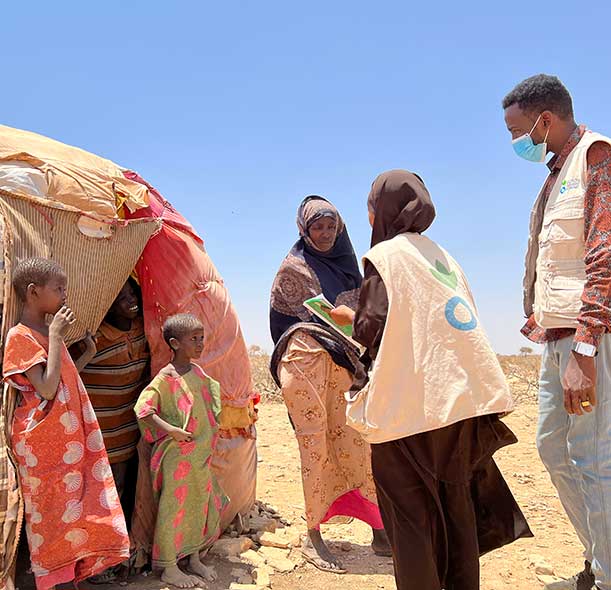Action Against Hunger, a leader in the global movement to end hunger, have today reported we’re seeing the highest rates of admission to its hunger treatment centres in Somalia since the NGO began working there in 1992. From January to April 2022, we’ve seen a 55% increase in the number of severely malnourished children admitted to our 51 nutrition and health centres across the country, compared to the same period last year. Yet, just 15% of Somalia’s humanitarian funding needs for 2022 have been met.
Soaring food prices, unprecedented drought and conflict are driving the alarming rise in hunger in Somalia – where six regions could face famine this year. Across the country, fuel costs have doubled in the last month and the price of food continues to climb, in part due to the impacts of the war in Ukraine. In the El Barde region, for example, costs of staple goods have more than doubled since May of 2021: vegetable oil has increased by 129% (3 litres has risen from $3.50 USD to $8), flour by 133% (50 kilograms from $30 to $70) and rice by 112% (50 kilograms from $33 to $70).
“High food prices and limited access to clean water have led to increases in severe malnutrition and alarming outbreaks of deadly water-borne diseases like cholera,” said Ahmed Khalif, Action Against Hunger’s Country Director in Somalia. “Our teams have rapidly scaled up famine prevention and emergency treatment programmes, but we need more resources and guaranteed safe access to reach the most vulnerable people. More severely malnourished children are showing up to our stabilisation centres than ever and, while most cases are treatable, we don’t have enough funds, medicines, or beds to admit everyone in need.”
As more Somali children’s lives are in jeopardy, securing lifesaving treatment for malnutrition could become even more challenging in the months ahead. The war in Ukraine is threatening the global supply of Ready-to-Use Therapeutic Foods (RUTF), the fortified peanut paste that can bring a malnourished child back to full health in as little as six weeks. According to a report from Unicef released this week, global prices for RUTF are expected to increase by 16% over the next six months as the costs for transportation and ingredients like peanuts, sugar and oil continue to rise.
Vulnerable communities in Somalia also are dealing with prolonged drought that has killed up to 30% of livestock since the middle of 2021. Nearly 800,000 people in Somalia have been forced to flee their homes, seeking refuge in displacement camps and severely straining camp resources. People are resorting to desperate measures to secure food for their families.
“Conflict is both a cause and consequence of hunger, and we are deeply concerned about the potential impact of increasing hunger on peace and stability in Somalia,” said Khalif. “Insecurity and political instability make it harder for organisations like Action Against Hunger to safely deliver aid to the most vulnerable communities. As the threat of famine looms in six areas of Somalia, we urgently call for unimpeded humanitarian access to people in need and increased and flexible funding to meet growing needs.”
Somalia is not alone in facing a severe hunger crisis in the region. Across the Horn of Africa, 6.8 million children are suffering from acute malnutrition. Action Against Hunger urges world leaders to take bold and immediate action to save lives and provide assistance to than 23 million people who face rising food insecurity in Ethiopia, Kenya, and Somalia.
“We are seeing record levels of people facing life-threatening hunger and 26 million children suffering from wasting, leaving them vulnerable to developmental delays, disease and death,” said Jean-Michel Grand, Action Against Hunger UK’s Executive Director.
“We know how early intervention saves lives – as we saw in the 2017 Somalia drought – therefore governments must take urgent action now to build resilience and prevent millions from facing starvation and hundreds of thousands young children from suffering severe malnutrition.”
Action Against Hunger in Somalia
Working in the country since 1992, our teams in Somalia are preventing and treating hunger, improving water and sanitation and strengthening health systems. We have provided treatment to nearly 100,000 people for malnutrition and other illnesses so far in 2022. To prevent the spread of disease, we are supporting measles vaccination campaigns, cholera treatment centres and providing supplies and education to promote hygiene. Our teams are also helping thousands of families who face drought and hunger through cash transfers, emergency water trucking and agricultural innovations such as solar irrigation kits.


